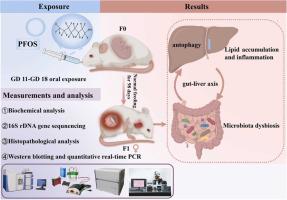当前位置:
X-MOL 学术
›
J. Hazard. Mater.
›
论文详情
Our official English website, www.x-mol.net, welcomes your feedback! (Note: you will need to create a separate account there.)
Maternal PFOS exposure in mice induces hepatic lipid accumulation and inflammation in adult female offspring: Involvement of microbiome-gut-liver axis and autophagy
Journal of Hazardous Materials ( IF 13.6 ) Pub Date : 2024-03-30 , DOI: 10.1016/j.jhazmat.2024.134177 Wenjie Yi , Junwen Shi , Liying Wang , Dongxuan Wang , Yiting Wang , Jingwen Song , Lili Xin , Fei Jiang
Journal of Hazardous Materials ( IF 13.6 ) Pub Date : 2024-03-30 , DOI: 10.1016/j.jhazmat.2024.134177 Wenjie Yi , Junwen Shi , Liying Wang , Dongxuan Wang , Yiting Wang , Jingwen Song , Lili Xin , Fei Jiang

|
Perfluorooctane sulfonates (PFOS) are the persistent organic pollutants. In the present study, 0, 0.3, or 3-mg/kg PFOS were administered to pregnant mice from GD 11 to GD 18. The histopathology of liver and intestine, serum and hepatic lipid levels, lipid metabolism related genes, and gut microbiota were examined in adult female offspring. The results suggested that maternal PFOS exposure increased serum levels of alanine aminotransferase (ALT), aspartate aminotransferase (AST), and induced F4/80 macrophage infiltration in adult female offspring, in addition to the elevation of and mRNA levels in low-dose and high-dose groups, respectively. Furthermore, maternal exposure to PFOS increased serum triglyceride (TG) and hepatic total cholesterol (TC) levels, which was associated with the alteration of the process of fatty acid transport and β-oxidation, TG synthesis and transport, cholesterol synthesis and excretion in the liver. The AMPK/mTOR/autophagy signaling was also inhibited in the liver of adult female offspring. Moreover, changes in gut microbiota were also related to lipid metabolism, especially for the , , and . Additionally, maternal exposure to PFOS decreased mRNA expressions of the tight junction protein and AB goblet cells in the colon, while increasing the overproduction of lipopolysaccharides (LPS) and F4/80 macrophage infiltration. Collectively, maternal PFOS exposure induced liver lipid accumulation and inflammation, which strongly correlated with the disruption of the gut-liver axis and autophagy in adult female offspring, highlighting the persistent adverse effects in offspring exposed to PFOS.
中文翻译:

小鼠母体 PFOS 暴露会诱导成年雌性后代的肝脏脂质积累和炎症:微生物组-肠-肝轴和自噬的参与
全氟辛烷磺酸(PFOS)是持久性有机污染物。在本研究中,从 GD 11 至 GD 18 给怀孕小鼠施用 0、0.3 或 3 mg/kg PFOS。在成年雌性后代中进行检查。结果表明,母体 PFOS 暴露除了导致低剂量和高剂量的 PFOS 和 mRNA 水平升高外,还增加成年雌性后代的丙氨酸转氨酶 (ALT)、天冬氨酸转氨酶 (AST) 血清水平,并诱导 F4/80 巨噬细胞浸润。 -剂量组,分别。此外,母亲接触PFOS会增加血清甘油三酯(TG)和肝脏总胆固醇(TC)水平,这与脂肪酸转运和β-氧化、TG合成和转运、胆固醇合成和排泄过程的改变有关。肝。 AMPK/mTOR/自噬信号在成年雌性后代的肝脏中也受到抑制。此外,肠道微生物群的变化也与脂质代谢有关,尤其是 、 、 和 。此外,母体接触 PFOS 会降低结肠中紧密连接蛋白和 AB 杯状细胞的 mRNA 表达,同时增加脂多糖 (LPS) 的过量产生和 F4/80 巨噬细胞浸润。总的来说,母体 PFOS 暴露会引起肝脏脂质积累和炎症,这与成年雌性后代的肠肝轴破坏和自噬密切相关,凸显了暴露于 PFOS 的后代的持续不利影响。
更新日期:2024-03-30
中文翻译:

小鼠母体 PFOS 暴露会诱导成年雌性后代的肝脏脂质积累和炎症:微生物组-肠-肝轴和自噬的参与
全氟辛烷磺酸(PFOS)是持久性有机污染物。在本研究中,从 GD 11 至 GD 18 给怀孕小鼠施用 0、0.3 或 3 mg/kg PFOS。在成年雌性后代中进行检查。结果表明,母体 PFOS 暴露除了导致低剂量和高剂量的 PFOS 和 mRNA 水平升高外,还增加成年雌性后代的丙氨酸转氨酶 (ALT)、天冬氨酸转氨酶 (AST) 血清水平,并诱导 F4/80 巨噬细胞浸润。 -剂量组,分别。此外,母亲接触PFOS会增加血清甘油三酯(TG)和肝脏总胆固醇(TC)水平,这与脂肪酸转运和β-氧化、TG合成和转运、胆固醇合成和排泄过程的改变有关。肝。 AMPK/mTOR/自噬信号在成年雌性后代的肝脏中也受到抑制。此外,肠道微生物群的变化也与脂质代谢有关,尤其是 、 、 和 。此外,母体接触 PFOS 会降低结肠中紧密连接蛋白和 AB 杯状细胞的 mRNA 表达,同时增加脂多糖 (LPS) 的过量产生和 F4/80 巨噬细胞浸润。总的来说,母体 PFOS 暴露会引起肝脏脂质积累和炎症,这与成年雌性后代的肠肝轴破坏和自噬密切相关,凸显了暴露于 PFOS 的后代的持续不利影响。



























 京公网安备 11010802027423号
京公网安备 11010802027423号